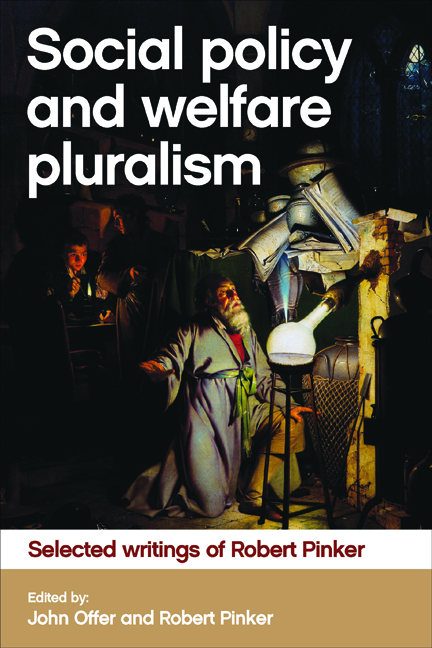Book contents
- Frontmatter
- Contents
- Acknowledgement
- Preface
- General introduction: Robert Pinker on rethinking approaches to welfare
- Introduction to Part One On social policy studies
- one The ends and means of social policy: a personal and generational perspective
- two Social theory and social policy: a challenging relationship
- three Stigma and social welfare
- four The welfare state: a comparative perspective
- five Richard Titmuss and the making of British social policy studies after the Second World War: a reappraisal
- Introduction to Part Two On social care, communities and the conditions for well-being
- six Report of the Working Party on the Role and Tasks of Social Workers: an alternative view
- seven The quest for community: from the Settlement Movement to the Griffiths Report: an historical perspective
- eight Citizenship, civil war and welfare: the making of modern Ireland
- Introduction to Part Three On welfare pluralism
- nine Golden Ages and welfare alchemists
- ten From gift relationships to quasi-markets: an odyssey along the policy paths of altruism and egoism
- eleven The experience of citizenship: a generational perspective
- twelve The right to welfare
- thirteen The prospects for social policy in the UK after the 2015 General Election
- Afterword On the post-Brexit prospects for social policy in the UK
- References
- Index
eleven - The experience of citizenship: a generational perspective
Published online by Cambridge University Press: 08 April 2022
- Frontmatter
- Contents
- Acknowledgement
- Preface
- General introduction: Robert Pinker on rethinking approaches to welfare
- Introduction to Part One On social policy studies
- one The ends and means of social policy: a personal and generational perspective
- two Social theory and social policy: a challenging relationship
- three Stigma and social welfare
- four The welfare state: a comparative perspective
- five Richard Titmuss and the making of British social policy studies after the Second World War: a reappraisal
- Introduction to Part Two On social care, communities and the conditions for well-being
- six Report of the Working Party on the Role and Tasks of Social Workers: an alternative view
- seven The quest for community: from the Settlement Movement to the Griffiths Report: an historical perspective
- eight Citizenship, civil war and welfare: the making of modern Ireland
- Introduction to Part Three On welfare pluralism
- nine Golden Ages and welfare alchemists
- ten From gift relationships to quasi-markets: an odyssey along the policy paths of altruism and egoism
- eleven The experience of citizenship: a generational perspective
- twelve The right to welfare
- thirteen The prospects for social policy in the UK after the 2015 General Election
- Afterword On the post-Brexit prospects for social policy in the UK
- References
- Index
Summary
Introduction
All the preceding contributors to this distinguished series of memorial lectures bear witness to the enduring significance of Marshall's intellectual legacy. Some of them have drawn attention to aspects of citizenship which, in their opinion, Marshall overlooked or neglected. Others have explored issues that have only come to the forefront of academic and political debate since his death. These oversights and later developments are cogently reviewed in Anthony Rees's introductory essay to Citizenship Today and in the concluding essay that he wrote with Martin Bulmer (Bulmer and Rees, 1996: 1–23 and 269–83).
In choosing my subject for this lecture I decided to discuss Marshall's concept of citizenship from a generational perspective as it might be viewed from different vantage points in the life cycle. I chose this approach because I have long been of the opinion that there is a largely unexplored and potentially useful dimension to Marshall's model relating to the informal and subjective experience of citizenship at the level of everyday life.
In his account of the growth of citizenship and its component parts, Marshall focuses on changes that occurred at the level of formal institutions and across a broad continuum of historical development spanning three centuries. The tenor, style and content of his synthesis bears the qualities of a patrician detachment. Rees and Bulmer are, surely, correct when they describe Marshall's model of citizenship as a kind of Weberian ‘ideal type’, the purpose of which is to develop a ‘one-sided accentuation of reality in order to understand at an abstract level what are the properties of a class of events or processes and their workings’ (Bulmer and Rees, 1996: 270).
In this lecture, however, I want to bring out another aspect of Marshall's ‘ideal type’ of citizenship that he never developed but which, I believe, is immanent in all his work. I will start with the premise that Marshall's models of citizenship and, for that matter, ‘democratic welfare capitalism’, are much less one-sided ‘ideal types’ than the more extreme individualist and collectivist welfare models on offer. In particular, his account of the relationship between citizenship and welfare expresses a range of beliefs and values that are shared by a very wide constituency of ordinary people.
- Type
- Chapter
- Information
- Social Policy and Welfare PluralismSelected Writings of Robert Pinker, pp. 225 - 238Publisher: Bristol University PressPrint publication year: 2017



